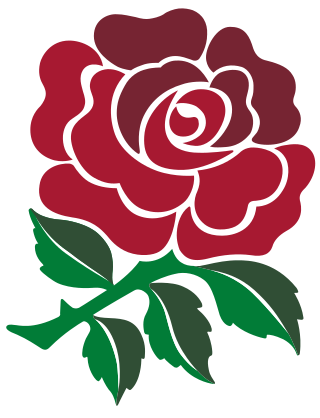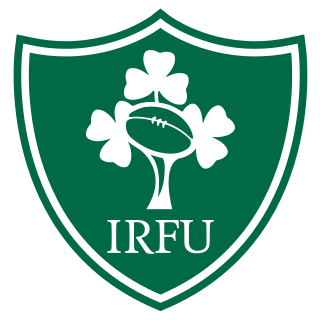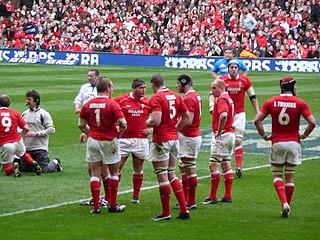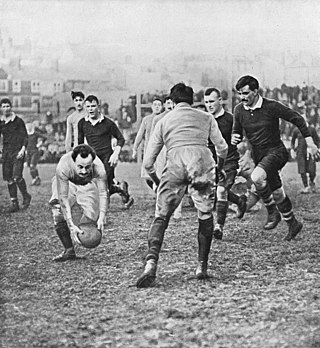
The England national rugby union team represents the Rugby Football Union in men's international rugby union. They compete in the annual Six Nations Championship with France, Ireland, Italy, Scotland and Wales. England have won the championship on 29 occasions, winning the Grand Slam 14 times and the Triple Crown 26 times, making them the most successful outright winners in the tournament's history. They are currently the only team from the Northern Hemisphere to win the Rugby World Cup, having won the tournament in 2003, and have been runners-up on three further occasions.

The Scotland national rugby union team represents the Scottish Rugby Union in men's international rugby union. The team takes part in the annual Six Nations Championship, where they are the current Calcutta Cup and Doddie Weir Cup holders. They also participate in the Rugby World Cup, which takes place every four years.

The Wales national rugby union team represents Wales in men's international rugby union. Its governing body, the Welsh Rugby Union (WRU), was established in 1881, the same year that Wales played their first international against England. The team plays its home matches at the Millennium Stadium in Cardiff, which replaced Cardiff Arms Park as the national stadium of Wales in 1999.

The Ireland national rugby union team is the men's representative national team for the island of Ireland in rugby union. The team represents both the Republic of Ireland and Northern Ireland. Ireland competes in the annual Six Nations Championship and in the Rugby World Cup. Ireland is one of the four unions that make up the British & Irish Lions – players eligible to play for Ireland are also eligible for the Lions.

The 2007 Six Nations Championship was the eighth series of the rugby union Six Nations Championship. Including the previous incarnations as the Home Nations and Five Nations, this was the 113th series of the international championship. Fifteen matches were played over five weekends from 3 February to 17 March.
The 1985 Five Nations Championship was the fifty-sixth series of the rugby union Five Nations Championship. Including the previous incarnations as the Home Nations and Five Nations, this was the ninety-first series of the northern hemisphere rugby union championship. Ten matches were played between 2 February and 20 April. The championship was contested by England, France, Ireland, Scotland and Wales.

The 2008 Six Nations Championship, known as the 2008 RBS 6 Nations because of sponsorship by the Royal Bank of Scotland, was the ninth series of the rugby union Six Nations Championship, the 114th series of the international championship.
The French national rugby union team first competed at the 1900 Summer Olympics.

Ian Scott Smith was a rugby union wing who played 32 Tests for Scotland and two Tests for the British Isles. Born in Melbourne, Australia, and brought up in New Zealand, Smith moved to England and was educated at Winchester College, before studying at Oxford University and later Edinburgh University. At Oxford he took up rugby and was eventually selected for Scotland, for whom he was eligible because of his Scottish parents. He toured with the British Isles to South Africa in 1924, and played all four matches in Scotland's first ever Five Nations Grand Slam in 1925. He represented Scotland until 1933 when he captained them in their Triple Crown winning season. His 24 international tries, all scored in the Five Nations or Home Nations, was an international record until 1987 and a record for the Five/Six Nations until 2011. This record stood for 88 years until 2021, when it was broken by Stuart Hogg.
The 1995 Five Nations Championship was the 66th Five Nations Championship, the annual Northern Hemisphere rugby union competition contested by the national teams of England, France, Ireland, Scotland and Wales. It was also the last Five Nations held in the sport's amateur era, as rugby union's governing body, the International Rugby Football Board, opened the sport to professionalism on August 26 of that year. Including the previous incarnations as the Home Nations and Five Nations, this was the hundred-and-first series of the northern hemisphere rugby union championship. Ten matches were played over five weekends from 21 January to 18 March. It was also the fifth occasion, after 1978, 1984, 1990 and 1991, on which two teams each with three victories faced off against each other in the final round of matches, with both capable of completing a Grand Slam with a victory, and the second time that the Triple Crown had also been at stake at the same time, as a result of England and Scotland's earlier victories over the other Home Nations. The tournament took a surprisingly similar course to five years earlier, where England and Scotland both won their first three matches and met in the final week, with an undefeated record, a Grand Slam, Triple Crown and the Calcutta Cup all at stake for the victor: however, this time it was England who prevailed in the deciding match. Even the minor placings were the same as in 1990, as France came third, Ireland fourth and Wales were whitewashed.
The 1913 Five Nations Championship was the fourth series of the rugby union Five Nations Championship following the inclusion of France into the Home Nations Championship. Including the previous Home Nations Championships, this was the thirty-first series of the annual northern hemisphere rugby union championship. Ten matches were played between 1 January and 24 March. It was contested by England, France, Ireland, Scotland and Wales.
The 1923 Five Nations Championship was the ninth series of the rugby union Five Nations Championship following the inclusion of France into the Home Nations Championship. Including the previous Home Nations Championships, this was the thirty-sixth series of the annual northern hemisphere rugby union championship. Ten matches were played between 20 January and 14 April. It was contested by England, France, Ireland, Scotland and Wales.
The 1924 Five Nations Championship was the tenth series of the rugby union Five Nations Championship following the inclusion of France into the Home Nations Championship. Including the previous Home Nations Championships, this was the thirty-seventh series of the annual northern hemisphere rugby union championship. Ten matches were played between 1 January and 27 March. It was contested by England, France, Ireland, Scotland and Wales.
The 1954 Five Nations Championship was the twenty-fifth series of the rugby union Five Nations Championship. Including the previous incarnations as the Home Nations and Five Nations, this was the sixtieth series of the northern hemisphere rugby union championship. Ten matches were played between 9 January and 10 April. It was contested by England, France, Ireland, Scotland and Wales. Wales, England and France shared the championship; this marked France's first title. England won the Triple Crown and the Calcutta Cup.

Rugby union in Scotland in its modern form has existed since the mid-19th century. Scotland has one of the oldest rugby union traditions and has introduced various innovations including rugby sevens.

France and Wales have played each other at rugby union since 1908. A total of 104 matches have been played, with Wales winning 51 times, France 50 times and the remaining three finishing as draws.
The 2016 Six Nations Championship, known as the 2016 RBS 6 Nations due to the tournament's sponsorship by The Royal Bank of Scotland, was the 17th series of the Six Nations Championship, the annual northern hemisphere rugby union championship.
The history of the Ireland national rugby union team began in 1875, when Ireland played its first international match, a 0–7 loss against England. Ireland has competed in the Six Nations rugby tournament since 1883. Ireland has also competed at the Rugby World Cup every four years since its inception.
The 2018 Six Nations Championship was the 19th Six Nations Championship, the annual international rugby union tournament for the six major European rugby union nations.
The 2019 Six Nations Championship was the 20th Six Nations Championship, the annual rugby union competition contested by the national teams of England, France, Ireland, Italy, Scotland, and Wales, and the 125th edition of the competition.








